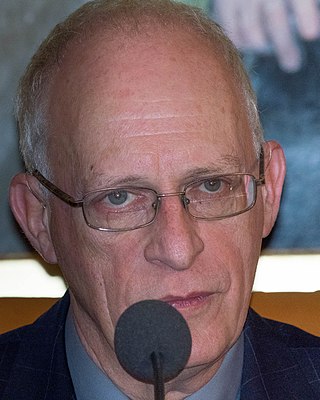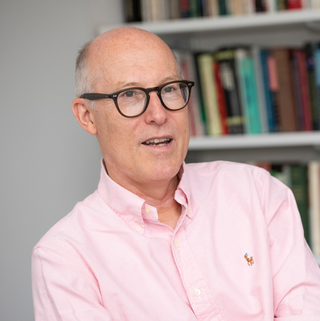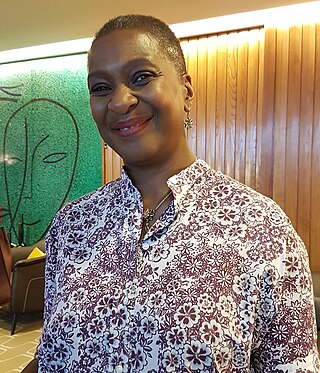Related Research Articles

Herbert Lionel Adolphus Hart was an English legal philosopher. One of the most influential legal theorists of the 20th century, he was instrumental in the development of the theory of legal positivism, which was popularised by his book, The Concept of Law. Hart's contributions focused on the nature of law, the relationship between law and morality, and the analysis of legal rules and systems, introducing concepts such as the "rule of recognition" that have shaped modern legal thought.

John Gardner was a Scottish legal philosopher. He was senior research fellow at All Souls College, Oxford, and prior to that the Professor of Jurisprudence at the University of Oxford and a fellow of University College, Oxford.

Sir Oliver Simon D'Arcy Hart is a British-born American economist, currently the Lewis P. and Linda L. Geyser University Professor at Harvard University. Together with Bengt R. Holmström, he received the Nobel Memorial Prize in Economic Sciences in 2016.

Craig Jackson Calhoun is an American sociologist who currently serves as the University Professor of Social Sciences at Arizona State University. He is a strong advocate for applying social science to address issues of public concerns. Calhoun served as the Director of the London School of Economics and Political Science (LSE) from September 2012 until September 2016 and continues to hold the title of Centennial Professor of Sociology at LSE.

Sir Timothy John Besley, is a British academic economist who is the School Professor of Economics and Political Science and Sir W. Arthur Lewis Professor of Development Economics at the London School of Economics (LSE).

Lucia ZednerFBA is a British legal scholar. She is a professor of criminal justice at the University of Oxford and a senior fellow of All Souls College, Oxford.
John Halstead Hardman Moore CBE FBA FRSE is an economic theorist. He was appointed George Watson's and Daniel Stewart's Chair of Political Economy at the University of Edinburgh School of Economics in 2000. In 2018 he was appointed the David Hume University Professor at the University of Edinburgh. Previously, in 1983, he was appointed to the London School of Economics, where in 1990 he became Professor of Economic Theory, a position he still holds.
David William Soskice, FBA is a British political economist and academic. He is currently the LSE School Professor of Political Science and Economics at the London School of Economics.

Renata Salecl is a Slovene philosopher, sociologist and legal theorist. She is a senior researcher at the Institute of Criminology, Faculty of Law at the University of Ljubljana, and holds a professorship at Birkbeck College, University of London. She has been a visiting professor at London School of Economics, lecturing on the topic of emotions and law. Every year she lectures at Benjamin N. Cardozo School of Law, on Psychoanalysis and Law, and she has also been teaching courses on neuroscience and law. Since 2012 she has been visiting professor at the Department of Social Science, Heath and Medicine at King's College London. Her books have been translated into fifteen languages. In 2017, she was elected as a member of the Slovene Academy of Science.
Jeremy Christian Nicholas Horder is Professor of Criminal Law and former Head of Department at the London School of Economics and Political Science. From 2005 - 2010 he served as Law Commissioner for England and Wales. Horder graduated from the University of Hull in 1984 with an LLB. He then studied Civil Law at the University of Oxford, completing his DPhil while a Fellow of Jesus College. His thesis concerned homicide law from the 16th to the 20th Centuries. Horder was the Chairman of Oxford's Faculty of Law between 1998 and 2000. He is an Honorary Bencher of Middle Temple and former Edmund Davies Professor of Criminal Law at King's College London. He holds an Honorary LLD from the University of Hull. In 2014 he was elected a Fellow of the British Academy, the United Kingdom's national academy for the humanities and social sciences.
Julia Mary Black is the strategic director of innovation and a professor of law at the London School of Economics and Political Science (LSE). She was the interim director of the LSE, a post she held from September 2016 until September 2017, at which time Minouche Shafik took over the directorship. She is the president of the British Academy, the UK's national academy for the humanities and social sciences, and became the academy's second female president in July 2021 for a four-year term.
Dame Sarah Elizabeth Worthington, is a British legal scholar, professor at LSE Law School, barrister, and Deputy High Court Judge in the Chancery Division, specialising in company law, commercial law, and equity. From 2011 to 2022, she was the Downing Professor of the Laws of England at the University of Cambridge. She is Treasurer of the British Academy and a trustee of the British Museum.

Sara Binzer Hobolt, FBA is a Danish political scientist, who specialises in European politics and electoral behaviour. She holds the Sutherland Chair in European Institutions at the London School of Economics and Political Science.

Iyiola Solanke is an Academic Fellow in the Inner Temple and Jacques Delors Professor of European Union Law at the University of Oxford, where she is a Fellow of Somerville College. Previously, she was the Chair in European Union law at the University of Leeds. She is interested in the European Union and racial integration, and founded the Black Female Professors Forum in 2017.
Hanna Pickard is a Canadian philosopher who specializes in the philosophy of mind, philosophy of psychiatry, moral psychology, and medical ethics. She is a Bloomberg Distinguished Professor of Philosophy and Bioethics at Johns Hopkins University with appointments in the William H. Miller III Department of Philosophy in the Zanvyl Krieger School of Arts and Sciences and the Berman Institute of Bioethics.
The Department of Economics is an academic department of the University of Oxford within the Social Sciences Division. Relatively recently founded in 1999, the department is located in the Norman Foster-designed Manor Road Building.
Carola Frege is a German scholar who specialises in international and comparative employment relations. Her research interests include industrial democracy, employee participation, trade unions, migration, and populism. Since 2008, she has been professor of comparative employment relations at the London School of Economics (LSE). She was previously assistant and associate professor of labor relations at Rutgers School of Management and Labor Relations (SMLR) (2001–2003), and lecturer and reader in industrial relations at the London School of Economics Department. Frege is currently a senior research fellow of the International Inequalities Institute at London School of Economics.

Lea Ypi is an Albanian academic and author. She is a professor of political theory at the London School of Economics.
References
- 1 2 3 4 5 6 "Professor Nicola Lacey". All Souls College. Retrieved 18 February 2017.
- 1 2 3 4 5 6 7 8 9 "LACEY, Prof. Nicola Mary". Who's Who 2017. Oxford University Press. November 2016. Retrieved 18 February 2017.
- 1 2 3 4 5 6 7 8 "Nicola Lacey: Curriculum Vitae". London School of Economics. October 2016. Archived from the original (doc) on 19 February 2017. Retrieved 18 February 2017.
- 1 2 3 4 "Nicola Lacey". Law Department. London School of Economics. Retrieved 18 February 2017.
- ↑ "Recognition of Distinction". Oxford University Gazette. 141 (4928). 30 September 2010. Retrieved 19 February 2017.
- ↑ "The Categories of Fellowship". All Souls College. Retrieved 19 February 2017.
- 1 2 3 4 "Professor Nicola Lacey FBA CBE". British Museum. Trustees of the British Museum. Retrieved 18 February 2017.
- ↑ "Past Distinguished Global Fellows". School of Law. New York University. Retrieved 19 February 2017.
- ↑ "Liberty Policy Council Members" (PDF). Liberty. Retrieved 19 February 2017.
- ↑ "Professor Nicola Lacey". The British Academy. Retrieved 18 February 2017.
- ↑ "No. 61803". The London Gazette (Supplement). 31 December 2016. pp. N8–N9.
- ↑ "Hans Sigrist Prize Winners". The Hans Sigrist Foundation. Retrieved 18 February 2017.
- ↑ "Honorary Graduates in 2018". The University of Edinburgh. Retrieved 23 July 2018.
- ↑ "LSA 2022 Annual Awards Announced". Law and Society Association. Retrieved 15 July 2022.